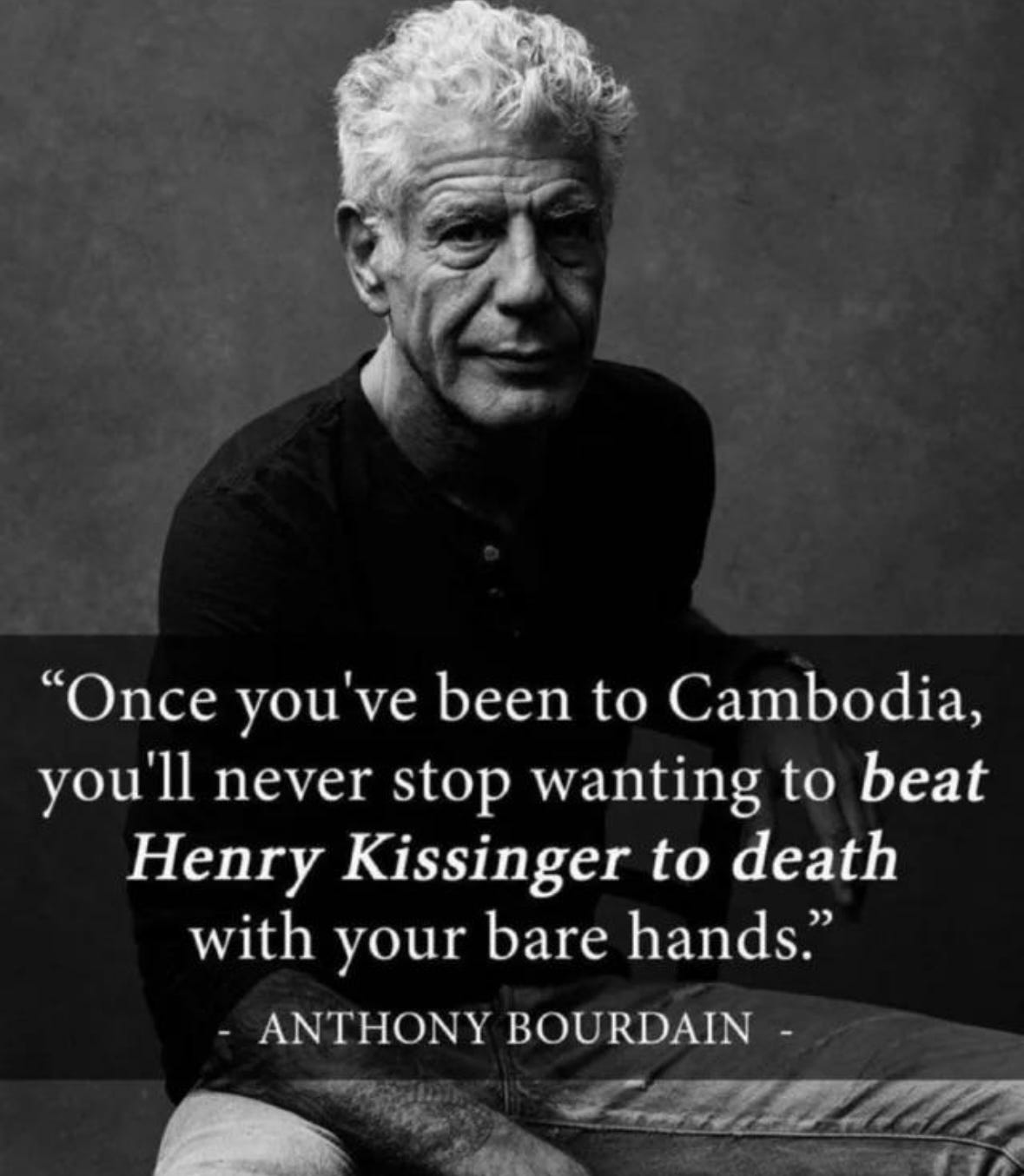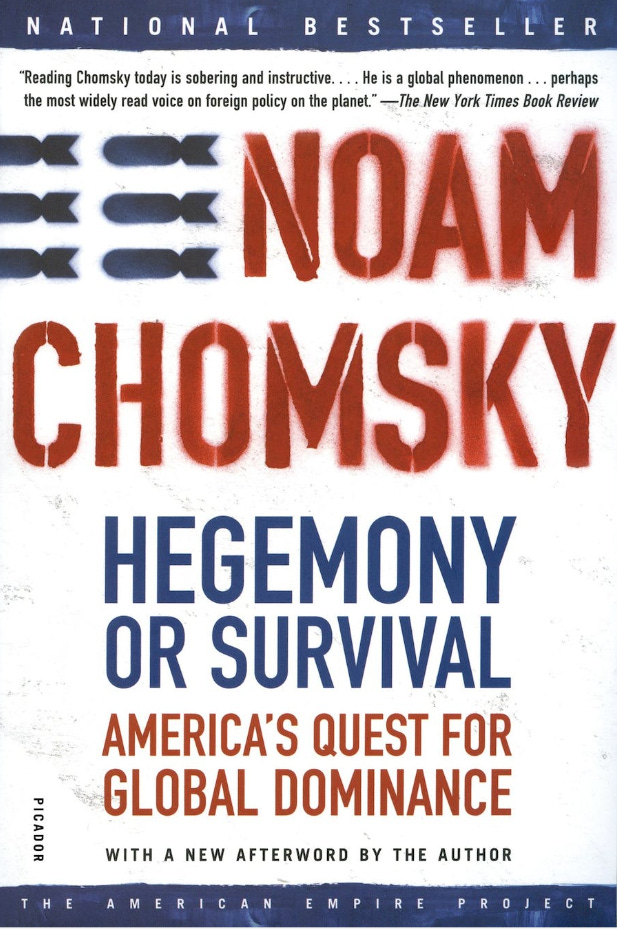Scattered Musings on Disparate Topics
But mostly still about Rod Dreher and Israel/Palestine...
The views expressed in this article are those of the author, expressed in an unofficial capacity, and do not reflect the official policy or position of the Department of the Navy, Department of Defense, or the U.S. government.
***
Some scattered observations this week, on topics related and unrelated, that have been in the news, as well as featured here at Cut the Cord.
1. MY STATEMENT UPON THE DEATH OF HENRY KISSINGER
‘nuff said.
2. POSTSCRIPT TO THE ROD DREHER FIASCO
My last essay, on the shocking (even by his standards) ravings of Rod Dreher was difficult to write, in that I had to stomach consuming a vastly larger amount of his material than that which I quoted in the piece. Even this was too much for some people – one reader informed me last weekend that she never made it past the “primitive root weiner” excerpt. Can’t say I blame her.
One interesting bit of personal history Rod let slip during his descent into the abyss was quite revealing – albeit unintentionally, as his stuff often is. I couldn’t find a way to work it into the piece I wrote a couple weeks ago, so I wanted to unpack it a bit here.
In a post entitled “Liberalism’s Last Stand,” Rod recounts “the precise moment” that began his break with “the Left.” Interestingly, the incident that supposedly triggered his turn to the right was also a key factor in my going in the opposite direction. That both of us were able to have such different reactions to the same thing shows the importance of diligently ensuring you have the full picture before forming an opinion, as opposed to reacting with your gut.
Here's what Rod had to say:
I remember the precise moment that I began my long, slow turn away from the Left. It was the morning of October 7, 1985 (though it might have been October 8). I was a college freshman, and was an idealistic member of the Progressive Student Network’s LSU [Louisiana State University] chapter. That morning I was set to work at the PSN’s information table in front of the student union building. As I ate breakfast, I watched the first news reports about the murder of elderly Leon Klinghoffer on the cruise ship Achille Lauro, which had been hijacked by Palestinian terrorists. They shot the wheelchair-bound American Jew and dumped his body overboard.
The cruelty of this act shocked me to the core. When I arrived at the PSN table on campus, I told my comrades (heh) how disgusted I was by it. One of the guys there, a tall, intense, bearded fellow, thundered that you always hear about Palestinian terrorism, but why don’t you ever hear about Israeli terrorism, huh? The other student at the table, a short Puerto Rican with thick, owlish glasses, sat under the oak tree and mused calmly that if Klinghoffer was wealthy enough to take the cruise, then he got what he deserved.
That was the end of me and the PSN. I remained a liberal for a few more years, but my heart wasn’t in it anymore.
I had heard of the Achille Lauro hijacking and the murder of Klinghoffer when I was in middle school, and was horrified by it, but it wasn’t until I was in my early 20’s that I had reason to give it sustained thought. As I’ve mentioned previously, one of my major influences has been the writing of Noam Chomsky. The first book of his that I read was the Iraq War-era Hegemony or Survival: America’s Quest for Global Dominance, which “knocked me on my ass,” to borrow Matt Damon’s line from Good Will Hunting about Howard Zinn’s People’s History of the United States.
Hegemony or Survival also mentions the Klinghoffer murder, but does so in context, something most American media will never do. In a section titled “The Art of ‘Disappearing’ Unwanted Facts,” Chomsky discusses US and Israeli policy toward the Middle East in the 1980s, noting that “the worst single atrocity during the 1980s was the Israeli invasion of Lebanon in 1982, which, like the murderous and destructive Rabin-Peres invasions of 1993 and 1996, had little pretext of self-defense. In light of crucial Reagan-Clinton support, these operations add to Washington’s record of state-supported international terrorism.”
Chomsky goes on to note that the “US was directly involved in many other acts of terror in the region” in the year 1985 alone – the same year as the Klinghoffer murder:
(1) Setting off a car bomb outside a Mosque in Beirut as people were leaving, which killed 80 people and wounded 250 others (the bombing was later “traced back to the CIA and British intelligence”).
(2) Providing support for the Israeli bombing of Tunis, which killed 75 people and was “unanimously condemned by the UN Security Council as an ‘act of armed aggression,’” with the US, of course, abstaining.
(3) Backing Shimon Peres’s attacks on villages in Israeli-occupied Lebanon, with “total casualties unknown.”
Chomsky notes that each of these acts, among others unmentioned here, “fall within the category of state-supported international terrorism, if not the more severe war crime of aggression,” but are classified in American culture as “crimes that are not crimes because they were backed by Washington.”
“In journalism and scholarship on terrorism,” Chomsky goes on, “1985 is recognized to be the peak year of Middle East terrorism, but not because of these events.” Rather, because of the murder of Klinghoffer aboard the Achille Lauro. Klinghoffer was “brutally murdered” by a “Palestinian terrorist group led by Abu Abbas,” Chomsky writes, and this “atrocity…is in no way mitigated by the terrorists’ plea that the hijacking was in retaliation for the far more murderous US-backed Israeli terrorist attack on Tunis a week earlier.” [emphasis mine]
This phenomenon of systemic, murderous policies carried out by governments leading to brutal retaliations (“blowback,” to use the CIA’s term) shouldn’t be difficult to understand. Nor should it be hard to comprehend that explaining the context for such retaliations is not at all the same thing as supporting or even merely justifying them (“in no way mitigated by the terrorists’ plea…”). But in much US commentary after 9/11, and more recently in the wake of October 7th, we’ve seen many people demonstrate a complete inability to understand this.
It's revealing that Rod Dreher followed his gut reaction to the Klinghoffer murder, rather than attempting to understand why someone might carry out such a brutal act. It shows a consistency on his part, since he’s been reacting the same way to current events in Israel and Gaza. It’s also revealing that he recounts a colleague asking why no one ever says anything about Israeli terrorism. Rod does not pause in that essay, nor, from what I’ve seen, in any of his others, to ponder that question. He treats it as something to dismiss out-of-hand. This is not the mark of an intellectually serious person.
The other comment he recounts, about Klinghoffer getting what he deserved for being rich, is of course evil and wrong. But – and here’s where credibility becomes key – I’m not inclined to take Rod at his word that such a comment was actually spoken. It may have been, for all I know; this is why anecdotes are tricky to discuss. But given how unreliable Rod has been when it comes to accurately relaying the views of others, I have no choice but to be skeptical. The comment is too suspiciously similar to his contemporary accusations that the entire American left consists of genocidal maniacs with no capacity for ordinary moral calculations, for me to unhesitatingly accept it.
Chomsky’s book, including his section on Klinghoffer, taught me that violence is wrong not only when carried out by those groups designated “terrorists,” but also when carried out on a far more massive scale by the US (or Israel), and that for a variety of reasons, American culture encourages us only to look at the former, and never the latter. It is that inconsistency which drives much of my work today. Conversely, people like Rod are driven by instinct. And if you haven’t developed good political instincts – which in most cases comes from not reading widely enough, and/or never reflecting on your own upbringing and the biases you developed from it – then acting on those instincts can turn you into something very, very ugly.
3. TERRORISM DEFINED
Speaking of Chomsky, readers not used to critical commentary on Western government policies may have bristled when he referred to “Washington’s record of state-supported international terrorism.” In mainstream parlance, terrorism is what they do, not what we do. Anyone brought up in the War on Terror years, as I was, will be familiar with this mindset. But Chomsky asks us to think harder.
Elsewhere in Hegemony, he probes the definition of the word “terrorism,” with unsettling results: “What constitutes terrorism? How does it differ from aggression or resistance? The operative answers are revealing, but the questions never entered the arena of public discussion. A convenient definition was adopted: terrorism is what our leaders declare it to be. Period.”[i] This was the only workable definition that would support the need to market post-9/11 policies as being directed against “terrorism.” Any more specific definition would have presented serious problems for policymakers. That does not mean, though, that more precise definitions don’t exist:
“A US Army manual defined terrorism as ‘the calculated use of violence or threat of violence to attain goals that are political, religious, or ideological in nature…through intimidation, coercion, or instilling fear.’ The official US Code gave a more elaborate definition, essentially along the same lines. The British government’s definition is similar: ‘Terrorism is the use, or threat, of action which is violent, damaging, or disrupting, and is intended to influence the government or intimidate the public and is for the purpose of advancing a political, religious, or ideological cause.’ These definitions seem fairly clear. They are close enough to ordinary usage, and are considered appropriate when discussing the terrorism of enemies.”[ii]
For what it’s worth, these definitions are almost word-for-word what I was taught terrorism was in my mariner/military education. However, despite their applicability, “almost no one uses them, and they have been rescinded, replaced by nothing sensible.” Why? Because these “official definitions of terrorism are virtually the same as the definitions of counterterror (sometimes called ‘low-intensity conflict,’ or ‘counterinsurgency’). But counterterror is official US policy, and it plainly will not do to say that the US is officially committed to terrorism.”[iii] [emphasis Chomsky’s] What’s even more problematic is that “it follows from [these definitions] that the US is a leading terrorist state.”[iv] [emphasis mine] This kind of thing is why Chomsky and others like him have been so marginalized within American culture – the critiques simply strike too close to home. Not-coincidentally, similar comments led to Martin Luther King Jr. being marginalized and despised near the end of his life – in his famous Riverside Church speech from 1967, King claimed that “[his] own government” was the “greatest purveyor of violence in the world,” noting the contradiction between Americans criticizing the violence of poor blacks in the ghettoes while actively cheering for incomparably greater violence in Indochina.
This critical examination of the term “terrorism” is very relevant for the situation regarding Gaza. It’s considered axiomatic that anyone who criticizes the Israeli response to October 7th must first condemn Hamas as a terrorist organization – which, of course, it is. The problem, however, is that by the official definitions of the term, the Israeli government is a far greater terrorist organization, which of course would be too much for many people to handle.
4. NAOMI KLEIN ON ZIONISM
This past September, Naomi Klein’s latest book Doppelganger: A Trip Into the Mirror World hit the shelves. It’s a wide-ranging, beautiful synthesis, as all her work is. It’s different from her past books in that it’s a bit more personal, almost memoir-ish, although it still manages to cover a lot of ground. It’s not really “about” Israel-Palestine. However, it nonetheless contains some powerful reflections on Klein’s upbringing that are seriously important to consider in light of what has been occurring in the region since October 7th, and in light of some of the more unhinged reactions to criticisms of Israel’s government.
In a discussion of the politics of historical memory, Klein laments that “to many people, a truthful telling of history feels like treachery – and must be stamped out.”[v] This obviously has wide-ranging contemporary applicability, particularly to the educational policies currently being carried out by the government of Florida, which probably needs no elaboration. But it is also relevant given the furious arguments raging over the history of the Israeli-Palestinian conflict. A truthful telling of that history does indeed alarm people. Indeed, attentive readers may recall that I witnessed people publicly espousing Nakba-denial a few weeks ago.
Klein turns from historical memory generally to zero in on her upbringing in a “Hebrew day school in Montreal,” where, “as in so many schools like it, the facts of the Nazi genocide were drummed into us like arithmetic tables.” Her musings offer some insight into why so many contemporary individuals seem to feel personally under attack when Israel is criticized. Klein’s reflections are profound, and deserve to be quoted at some length:
Looking back as the parent of a child older than we were then, I am struck by what wasn’t a part of these strangely mechanical retellings. There was space for the surface-level emotions: horror at the atrocities, rage at the Nazis, a desire for revenge. But not for the more complex and troubling emotions of shame, or guilt, or for reflection on what duties the survivors of genocide may have to oppose genocidal logics in all of their forms. I am struck that we never actually grieved, nor were we invited to seize our anger and turn it into an instrument for solidarity.
Many years later, my friend Cecilie Surasky, then one of the leaders of Jewish voice for Peace, observed of these kinds of educational methods: “it’s re-traumatization, not remembering. There is a difference.” When she said it, I knew it was true. Remembering puts the shattered pieces of our selves back together again (re-member-ing); it is a quest for wholeness. At its best, it allows us to be changed and transmuted by grief and loss. But re-traumatization is about freezing us in a shattered state; it’s a regime of ritualistic reenactments designed to keep the losses as fresh and painful as possible. Our education did not ask us to probe the parts of ourselves that might be capable of inflicting great harm on others, and to figure out how to resist them. It asked us to be as outraged and indignant at what happened to our ancestors as if it had happened to us – and to stay in that state.
The reason for this frozen quality to our education, I now see, was that the Holocaust was a plot point in a larger, pre-written story we not only were being told but also were trapped inside: a phoenix-from-the-flames narrative that began in the gas chambers of Nazi-controlled Europe and ended on the hilltops around Jerusalem. Though there were certainly exceptions, for the most part, the goal of this teaching was not to turn us into people who would fight the next genocide wherever it occurred. The goal was to turn us into Zionists.[vi]
This chapter has much more material on this thorny issue; the above is merely a sampling. The whole book is gold, and deserves to be widely read and discussed. I read Doppelganger as soon as it came out, in September, and I remember thinking then that I should review it for Cut the Cord, but time constraints, alas, became too severe. Nonetheless I haven’t been able to get the sections of the book that deal with Israel-Palestine out of my head lately, especially this one. I’ve encountered quite a few people recently who show signs of having gone through an education consisting of re-traumatization, rather than remembering. I don’t know what the solution to that is, other than for saner voices like Klein’s to be allowed a hearing amid all the shrieking.
[i] Chomsky, Hegemony or Survival, pp. 109-110
[ii] Chomsky, Hegemony or Survival, p. 188
[iii] Chomsky, Hegemony or Survival, p. 188-189
[iv] Chomsky, Hegemony or Survival, p. 189
[v] Klein, Doppleganger, p. 276
[vi] Klein, Doppleganger, p. 297-298Thank you for reading Cut the Cord. This post is public so feel free to share it.







I still think Rod Dreher is a paid Hasbara agent. The fact that he is only shocked by the Kilinghooffer incident seems to be even more proof.